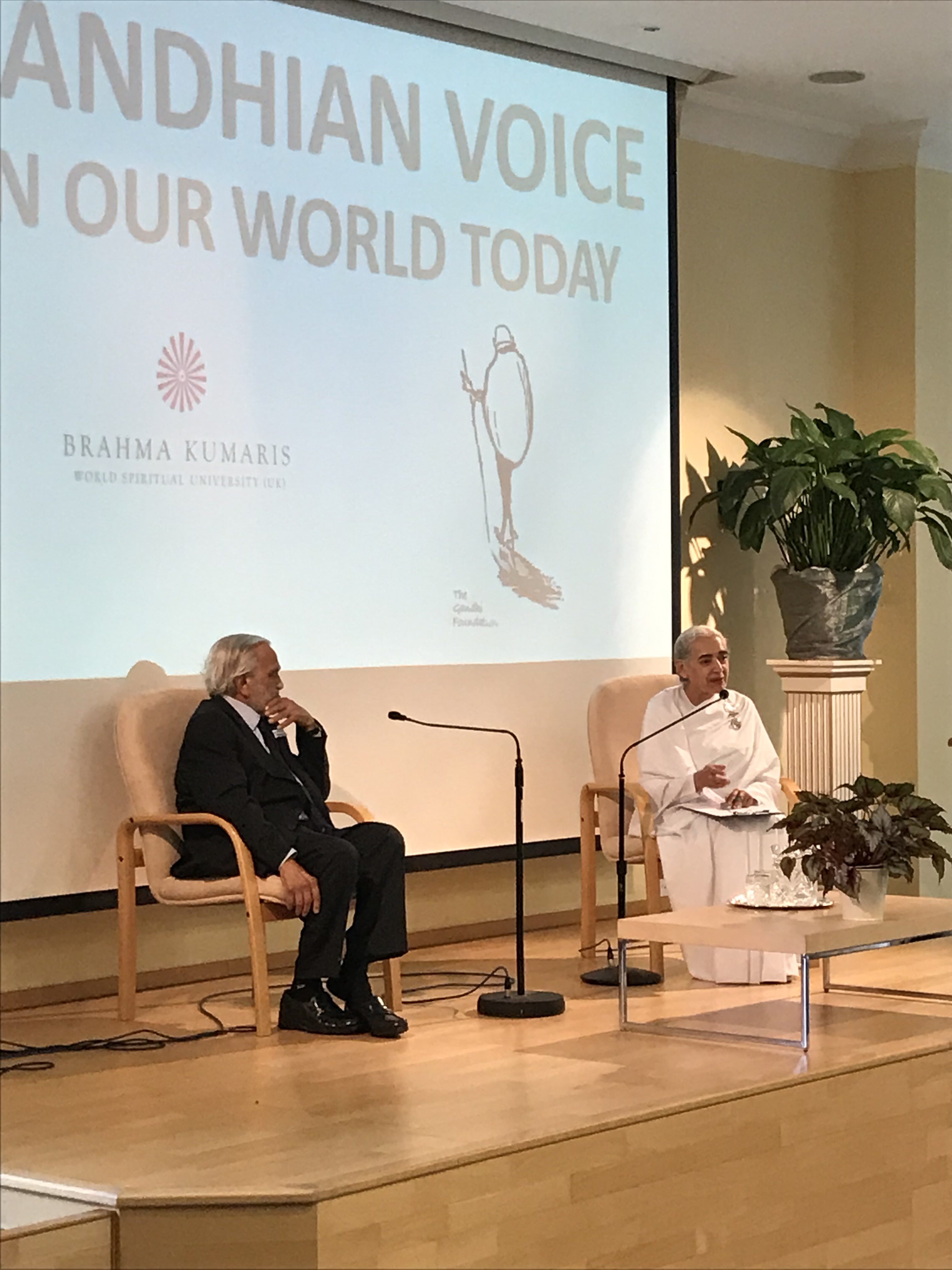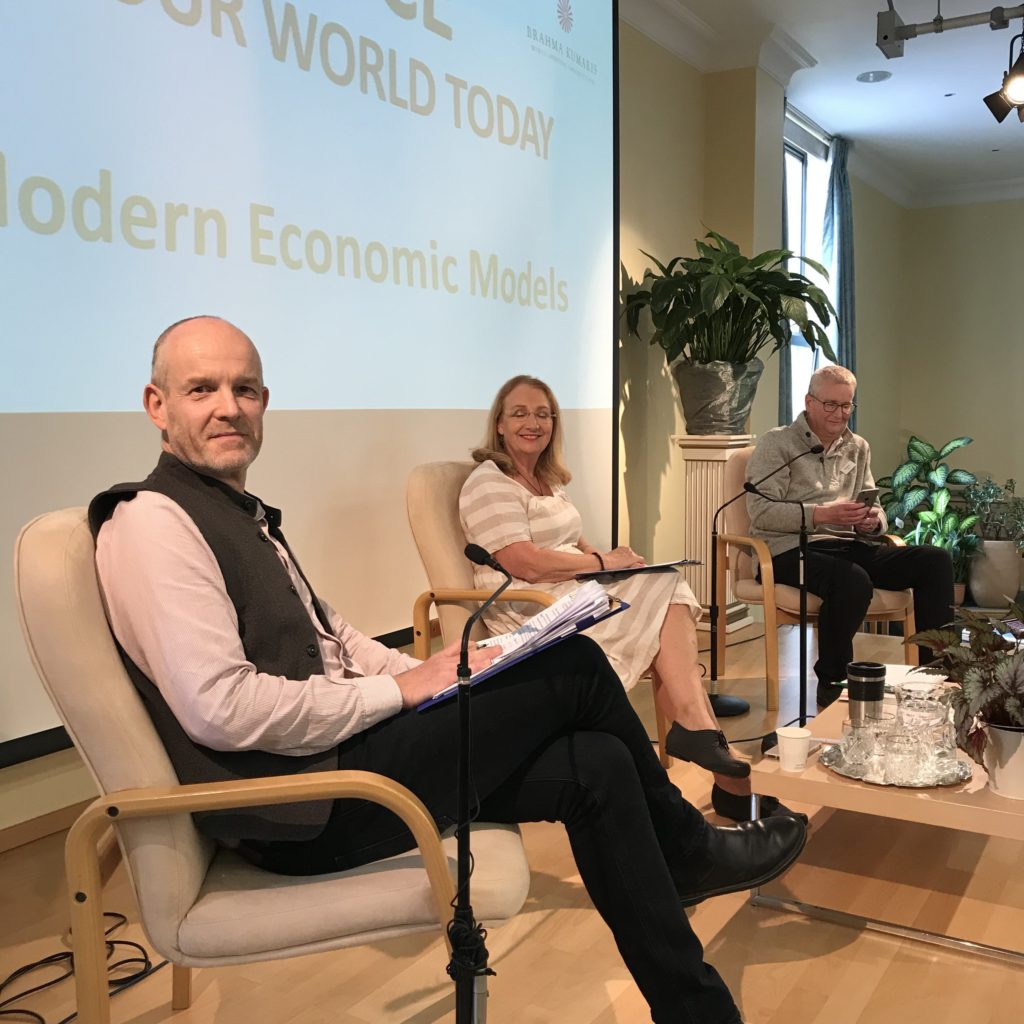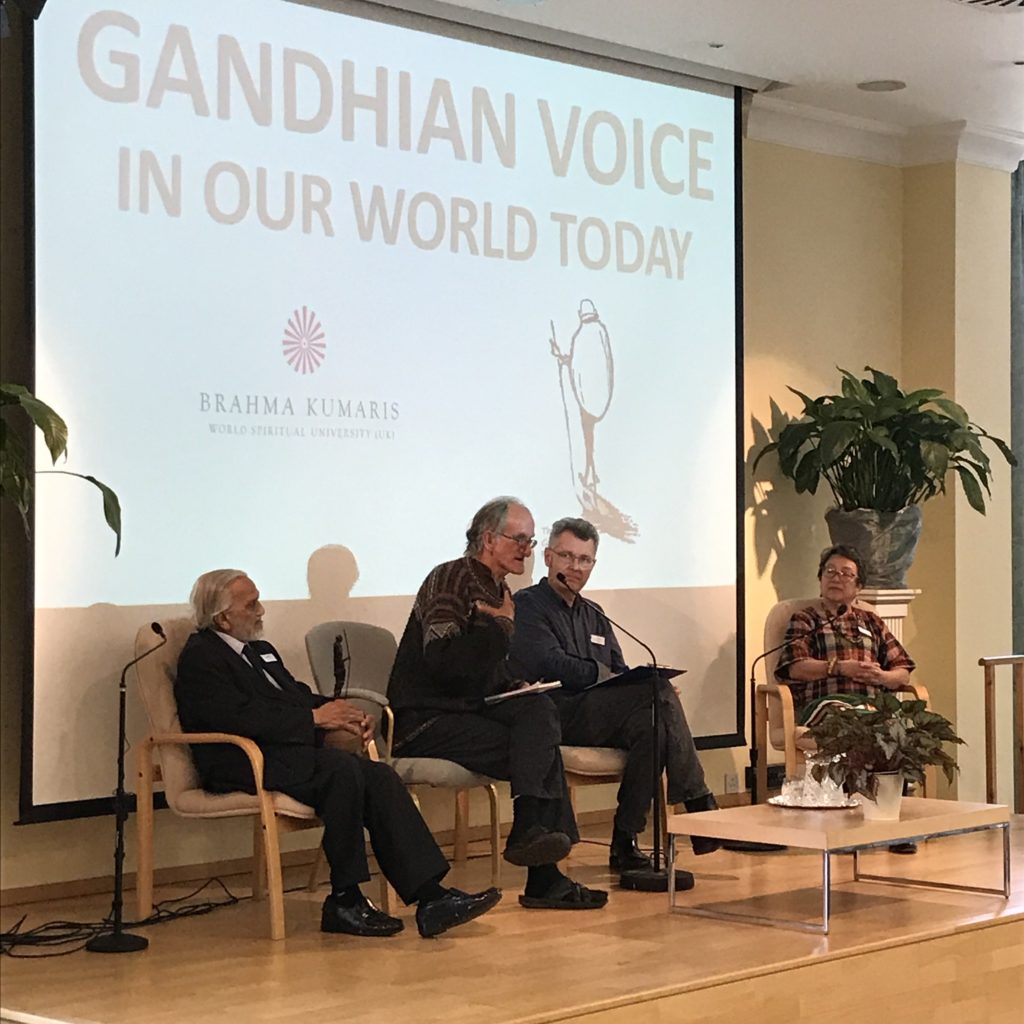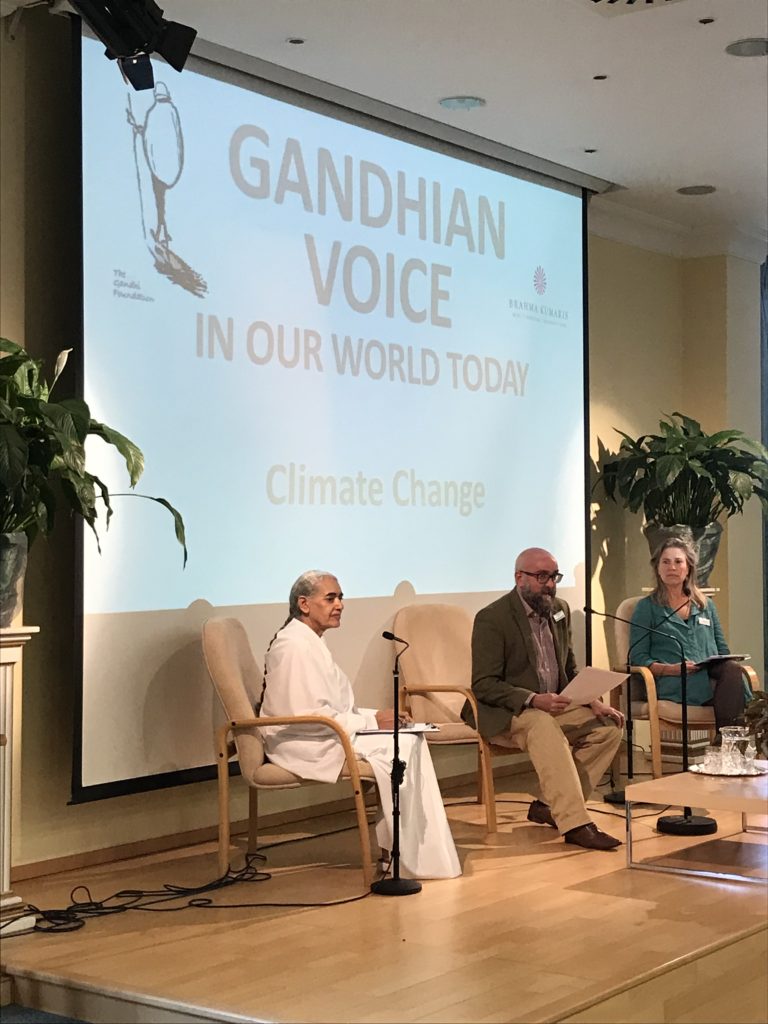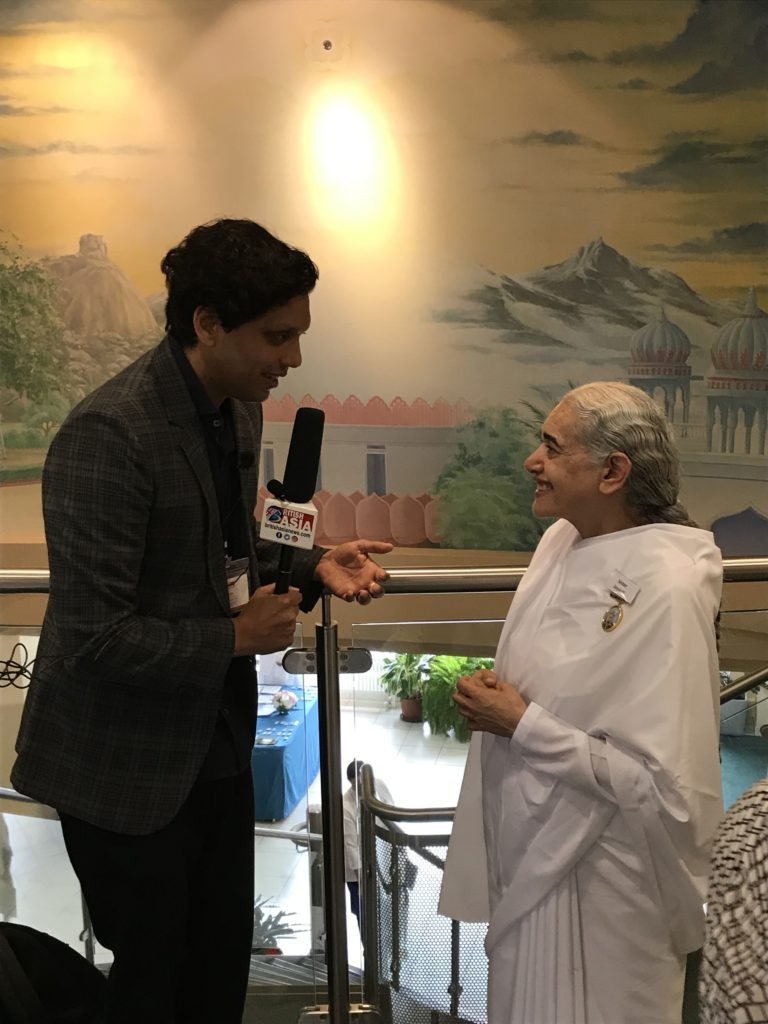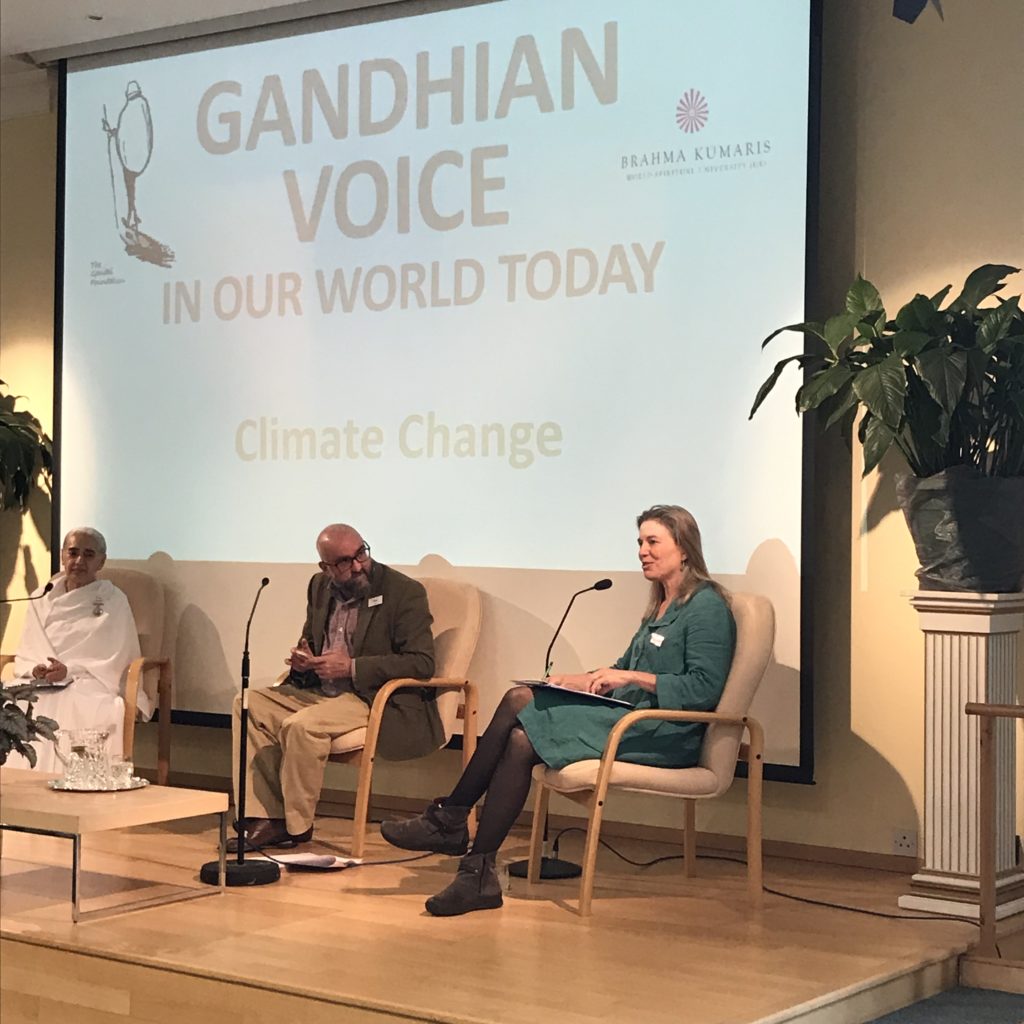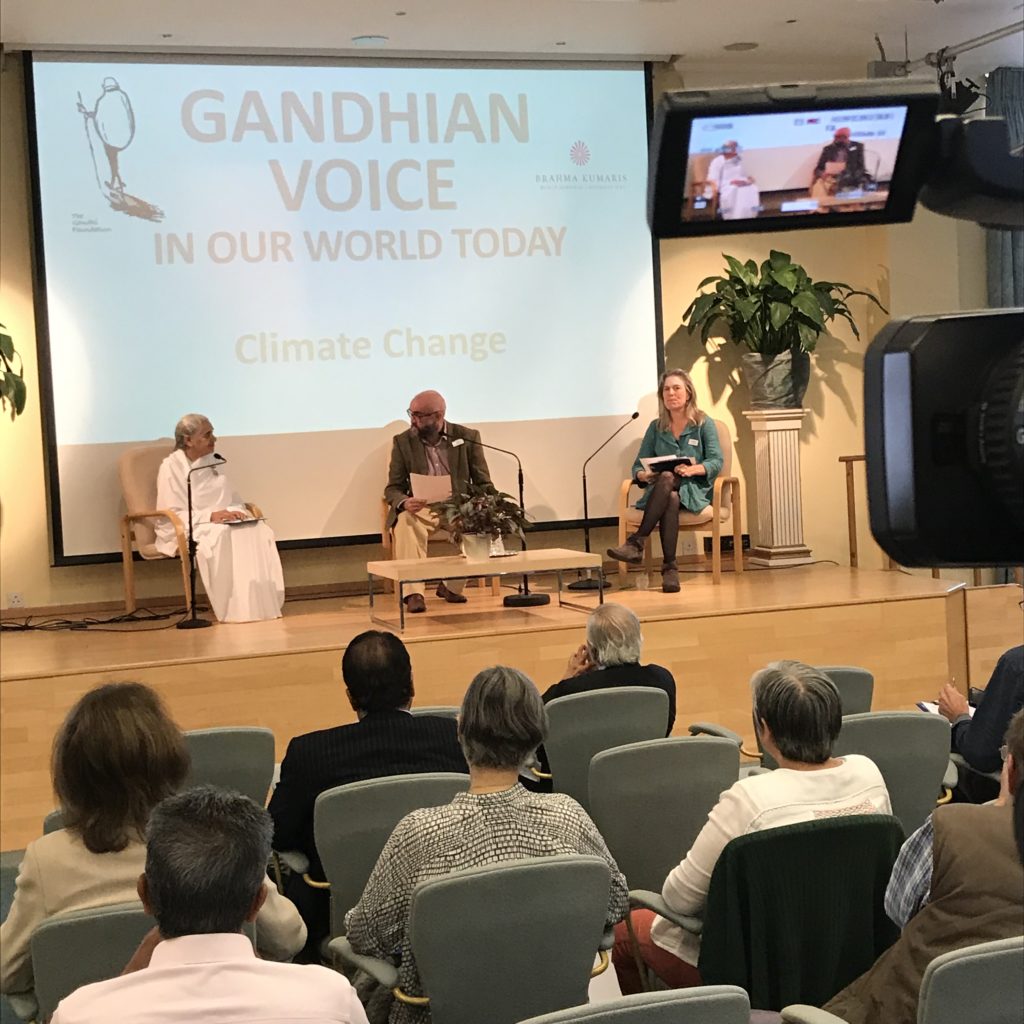London ( UK ): This year, to mark the 150th birth anniversary of Gandhi, a very special conference was jointly organised by the Gandhi Foundation and the Brahma Kumaris. A rich and diverse grouping of speakers, all committed activists and pioneers in their own fields, presented and discussed how positive change can be practically enacted in the world in line with Gandhi’s philosophy and ideals.
Attendees were warmly greeted by members of the Brahma Kumari community whose generous hospitality and meticulous organisation created a peaceful and conducive atmosphere for the smooth running of the day. Refreshments and delicious vegan fare were offered throughout the event which took place in the light and spacious Global Co-operation House, home of the Brahma Kumaris World Spiritual University (UK) in North London. The venue was home to a previous Gandhi Foundation event 25 years ago, when HH Dalai Lama was awarded the Gandhi Foundation Peace Award, which has greatly expanded since.
The day began with a welcome by Rachel Priestman, who introduced BK Sister Jayanti, European Director of the Brahma Kumaris, and Lord Bhikhu Parekh, President of the Gandhi Foundation. Rachel recalled how Dadi Janki, Spiritual Head of the Order, who is still active at the age of 104, used to attend Gandhi’s prayer meetings in India.
Lord Parekh set the tone of the day by explaining how the aim of the conference was to offer a fresh, contemporary look at the twin ideals of Gandhi: Ahimsa, non-violence, and Satya, truth. From a Gandhian perspective, how would the world look through the eyes of the young activist Greta Thunberg, for instance? Lord Parekh suggested that a more accurate translation of ahimsa in Gandhi’s eyes, was to show love and compassion rather than merely ‘Do no harm’. He went on to show the complexity and challenges of enacting other key concepts of Gandhi such as brahmacharya and satyagraha in today’s world.
The first session, facilitated by Lord Parekh, considered the question of non-violent resolution of conflict, the key speaker being Bruce Kent, well known as a committed peace activist, particularly for his work with CND (the Campaign for Nuclear Disarmament) and the Movement for the Abolition of War. But, as he explained, his life began in a very different way. Having been evacuated to Canada during the war, he was a bugler in a cadet corps at school and went on to join the army before becoming a priest. His wake-up call occurred when he came in contact with the CND march from Aldermaston to London which passed close to his parish church in Kensington, causing several of the brides he was due to marry, being late! This was the start of his life-long questioning of the validity and practicality of war and his involvement with groups such as Pax Christi. Like several of the panellists, and Gandhi himself, Bruce Kent read law, but at no point in his studies which began in 1949, was reference made to the Charter of the United Nations which had been drawn up in 1945 and which not only committed to ‘save succeeding generations from the scourge of war’, but also to affirm fundamental human rights, and international law, promoting peace and security. Whenever and wherever possible, Bruce said that he pinned the Charter on notice boards to make sure that it receives a wide audience. Such direct action, seemingly small, can be very helpful. Great activists who showed the Gandhian spirit such as Mother Theresa and Ghaffar Khan had a strong commitment to social change, to change things which they found intolerable. While not everyone can commit to that level, change does happen in little ways, especially when people group together. Women achieved the vote, slavery was abolished, and working conditions have been reformed. We should never sit on our laurels but continue to look at society and see what ways change can be effected in a world which is still deeply divided in terms of rich and poor.
Next to speak was Victoria Tauli-Corpuz, UN Special Rapporteur on the Rights of Indigenous Peoples, who later jointly was awarded the Gandhi Peace Award, along with Roger Moody and Andy Whitmore of the Mines & Communities organisation. Victoria was born in the Philippines and began her campaigning work in the early 1970s, defending thousands of local people who were being forcibly displaced by a dam project near Manila. It was then that she first heard of the UN Charter and wrote a strongly worded letter to Robert McNamara asking, ‘How dare you destroy our community?’ Victoria went on to espouse the cause of indigenous peoples throughout the world, many of whom were falling victim to mining corporations, set on obtaining their mineral-rich land. This, she said, was even a greater risk to many people than climate change. In the course of her work, she understood how indigenous people often felt forced to resort to violence, and how they had to fight ‘fake news’ which accused them of idly sitting on land which could be put to more profitable use or of aggravated trespass on lands which they had inhabited since time immemorial. ‘Our job is to tell the truth for people in situations of oppression’, Victoria stated. This stance has been at no small cost to herself, having been taken to court and receiving threats on account of her work. The receipt of the Peace Award would, she hoped, give her added protection in the recognition that would result. ‘Peace will only happen if we get together to protect people in that situation’, she said, ‘with the strong voice of non-violence, truth and reconciliation’.
Paul Gutteridge, Director of Initiatives of Change UK, described his work as ‘building trust across the world’s divide’ and how peace can be built in the world through personal change. Paul spoke of his own background and of his own transformation following an attack on his mother which he witnessed as a young child. As he said, ‘big doors swing on small hinges of personal decisions. From feeling deep anger and disempowerment, Paul was able to look deeply within and to change his simple internal narrative to one which encompassed the complexity and nuances which better reflected reality. From a narrow, inward-looking stance, he was able to look outwards and appreciate how deeply interconnected we all are. ‘We are not atomised’. While intellectually simple, this is emotionally very hard to assimilate.
There followed a short question-and-answer session discussing the role of young people in enacting change, how even small acts as writing to the local paper can have an effect and how there are ‘natural values’ common to all people. Lord Parekh ended the session with a question which Gandhi himself found hard to resolve. In relation to the question of non-violence in the face of oppression and injustice, ‘Why should the victim carry the burden of suffering?’
The second session, facilitated by women’s advocate and author Gina Lazenby, considered modern economic models. Andrew Simms, political economist and co-director of the New Weather Institute, reflected on Gandhi Ji’s views and how he stated that ‘he didn’t want [his] house to be walled in on all sides’, but equally needed some protection so as not to be blown off his feet. Andrew explained how our use of resources already far outstrips their sustainability. He devised ‘Earth Overshoot Day’ to mark the point at which we start living beyond our ecological means. This year it was reached by 29th July. Paul suggested that it was easier to imagine the end of the world than an end to the current economic system. He said how shocked he had been at college to discover in the Wall Street Journal, reference to a ‘Guide to investing in the apocalypse’. He explained how far-reaching changes must start now to help to rein in the effects of our over-consumption within the window of the next 10 years. But there is some hope. A few years ago, when all planes had been grounded overnight due to a volcanic eruption, alternative solutions had been found to cope with the situation. In recent years, a number of new companies addressing the issue, from repair cafes, to divesting the use of fossil fuels, have mushroomed. After Greta Thunberg took the train to London recently, there was a decrease in the number of flights booked from Sweden and a proportionate increase in train bookings. Paul spoke of ‘dynamic social contagion’ which helped to drive such changes.
Graeme Nuttall, again with a legal background, spoke of his work as an independent adviser to the government. As a result of the Nuttall Review, an employee-ownership trust was introduced in 2014 which has resulted in a large increase in the number of employee-owned businesses such as the innovative Riverford Organics which is strongly committed to environmentally friendly standards. Businesses with an egalitarian and equality basis are not new. The John Lewis partnership with 100% employee ownership was founded in 1929, but the new model will make it easier to form such companies and also to help support them to scale up as they increase in size. The effect on staff health and well-being, as well as the wider benefits, are tangible. While not all businesses which follow this model necessarily proscribe to ethical standards, this kind of business model promotes the ability of employees to have a much greater say, offer greater employee protection, and be harnessed for greater public good.
After a delicious vegan lunch which allowed speakers and attendees to mingle and further the discussions, there followed a short Annual General Meeting of the Gandhi Foundation before the award of the Gandhi Peace prize to Victoria Tauli-Corpuz and Andy Whitmore, from the Mines & Communities, a London-based resource centre campaigning about mining/metal projects which are often at the root of conflict in indigenous communities worldwide. The recipients were introduced by Felix Padel, an environmental activist and great, great grandson of Charles Darwin. Victoria said she was very happy to receive the award on behalf of all indigenous peoples and committed to carry on her fight for peace in non-violent ways.
The third session on climate change was facilitated by Mark Hoda. Lindsey Fielder Cook, representative for climate change, Quaker UN office in Geneva, described her work behind the scenes, connecting with grassroots communities worldwide and taking part in the intergovernmental panel on climate change and the Human Rights Council. Sister Jayanti who has represented the Brahma Kumaris at the United Nations since 1982, started by saying that nature being sacred is a spiritual concept – not only in the East but worldwide. The word sacred is defined as that which is not created by humans and we should view ourselves as being trustees of nature, responsible for its care. We need to get in touch with our inner being and work to create a future which all can enjoy in harmony and justice. The biggest challenge is how we can live sustainably and justly together. The rapid rise in temperature over such a short time with its predicted results will result in untold suffering if not held in check. A wide-ranging approach is needed in terms of solution, from changing our diets to ones having less impact on the environment and also our lifestyles. There were massive global challenges but, tapping into our inner human values, there are ‘huge things we can do’. The question-and-answer session which followed included the suggestion of introducing meat-free days each month, as happens in Ghent.
After a short discussion period in which the audience was invited to reflect on what had been learned from the day and, in particular what we had been inspired to do differently as a result of the day, Lord Parekh rounded up the discussions with a reflection on ‘Gandhian Voice’. How may the individual as well as the collective lead a non-violent life? Non-violence, for Gandhi, had a deeper meaning than ‘turning the other cheek’. It included the concept of caritas or love, which was the most important ingredient. Ahimsa is an expression of that love. But the application of ahimsa in everyday life is not always straightforward. The example of the terminally ill calf at Gandhi’s ashram was given. Expert advice was taken but nothing could save the calf and it was destined to die within the week. To save it from tremendous pain, Gandhi allowed a lethal injection to be given. This decision was strongly criticised by some. Gandhi responded by saying that this was not a violent act but an act to relieve pain. For Gandhi, ahimsa extended beyond the physical to thoughts and feelings, reducing harm through gossip and harmful speech.
Another question posed by ahimsa: can the human condition allow complete non-violence? Each life takes the life of another in one way or another; even the act of eating can destroy micro-organisms. A principled compromise needs to be worked out. In what situation is violence permissible? There were a number of changes in Gandhi’s position. He grew from truth to truth. You can’t freeze him at a point in history in the period from 1930 to 1947. His position was changing until the end of his life. If we want to continue Gandhi’s journey after 1948, we need to carry on in the Gandhian spirit. What would Gandhi’s response have been to nuclear weapons? What would have been Gandhi’s attitude to the Jews suffering the horrors of the extermination camps? Difficult, painful choices often need to be made. Gandhi said ‘My life is my text. After I am gone, you can burn my writings, but learn from my life’.
In terms of economic models, Gandhi was neither a capitalist nor a communist. He was against the concept of ownership and said he was a trustee. He would have commended the joint role of owners with workers in businesses guided by the public good.
Gandhi suffered so much in his life. He questioned how inequality can be reduced. If people behave like worms, they should not be surprised if they are trodden upon. Ultimately, victims need to stand up and refuse to co-operate. If you want to end a system, you need courage to refuse to participate in that system. For Gandhi, violence was an act of cowardice, non-violence an act of bravery.
BK Sister Jayanti ended the day with a period of guided reflection. She appreciated the way Gandhi had not been deified but seen as a real person, with all that entails. Although we would appear to be in Kali Yug or a dark age, there is a vision of hope and light for the future.

